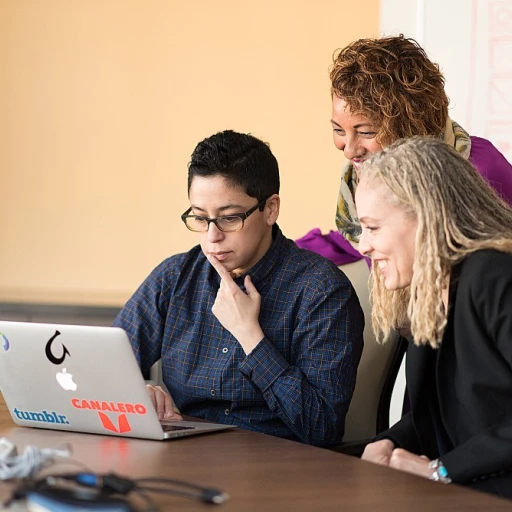
Understanding the Skills Gap
The Growing Divide in Skills
In today’s rapidly shifting work environment, the growing skills gap is a pressing concern for employers and employees alike. This gap represents the differences between the skills team members currently possess and those that are in demand. As industries evolve due to technological advancements and new methodologies, this gap becomes more pronounced, creating hurdles in filling roles effectively. Many team settings are encountering challenges in finding team-oriented professionals who can seamlessly integrate into a cross-functional team. The ability to work collaboratively as both a team player and an impactful contributor is increasingly vital. Companies are in need of individuals who not only excel in technical skills, but also possess strong collaborative skills. Organizations are recognizing the necessity of bridging this gap by investing in skill development programs to nurture cooperative colleagues capable of adapting to the demands of their evolving roles. The emphasis is now on fostering a positive work environment where each team member can contribute as a collaborative partner. For those seeking employment, this means showcasing adaptability and a comprehensive skill set on their resumes. Highlighting experience as a team collaborator or using synonyms like collaborative contributor or team associate can effectively communicate one's team-oriented nature. Addressing the skills gap is crucial, and implementing strategies such as digital coaching centers can play a significant role in closing this divide. As workplaces continue to transform, a concerted effort toward skill development will be essential for creating productive and adaptable teams.The Importance of Collaboration in the Workplace
Encouraging a Cohesive Environment Through Partnership
In today's competitive job market, the notion of collaboration has evolved beyond just a buzzword. Ensuring effective collaborativework within a team-oriented setting leads not only to positive outcomes but also strengthens any professional group. As companies seek collaborative contributors who can play an active role in projects, the skills gap becomes a focal point. Organizations increasingly demand members who can cooperate seamlessly with cross-functional teams.
A workplace rich in teamwork culture fosters an environment where each member's strengths are amplified and weaknesses are balanced. In finding the right balance, it's important to maintain a positive atmosphere with an emphasis on contributor engagement. This is where understanding the nuances of roles such as a "team player" or "team contributor" becomes beneficial.
- Promoting a culture of cooperation, where each cooperative colleague supports a cohesive objective, boosts efficiency.
- Effective collaboration involves roles that emphasize being a supportive partner and a proactive team associate.
- Infusing adaptability and embracing synonyms like collaborator or "group-oriented professional" into your resume can highlight versatility.
In a team setting, showing the ability to work well with others becomes a vital aspect of both personal and company-wide success. Creating impactful projects requires clear communication and a professional attitude towards shared goals. For those aiming to bridge the skills gap, focusing on nurturing your cooperative ability can be highly beneficial.
To close these gaps and enhance your role as a collaborative member of your organization, consider strategies like digital coaching to hone these essential skills. Whether you are preparing for your next career move or striving towards being an outstanding team player, understanding and engaging with the collaborative dynamics is invaluable. Discover more strategies on bridging these gaps by finding the right voice acting coach in your area.
Synonyms for Team Player: Expanding Your Vocabulary
Expanding Your Lexicon for Effective Collaboration
In today's diverse workplace, understanding the nuances of language plays a pivotal role in effectively communicating your skills and contributions on your resume and in professional settings. Being recognized as a "team player" can signal your ability to work collaboratively. However, differentiating yourself by expanding your vocabulary can be impactful. When describing your role in teamwork, consider the following synonyms:- Collaborator: Emphasizes your ability to work with others towards a common goal, showcasing your teamwork and communicative approach.
- Contributor: Highlights your active role in adding value and making a positive impact within group projects and tasks.
- Partner: Suggests a sense of shared responsibility and mutual support, ideal for environments that are team-oriented.
- Collaborative Contributor: Reflective of your skills in cross-functional team settings, indicating a cooperative colleague mindset.
- Team Associate: Another word to consider when noting your membership within a team, focusing on synergy and group dynamic contributions.
Skills Development: Closing the Gap
Boosting Competence Through Skills Acquisition
To effectively bridge the skills gap and enhance your capacity to thrive in collaborative workplaces, a focused approach to developing essential skills is key.- Focus on Practical Application: The journey to becoming a reliable and impactful team player begins with acquiring the skills listed in your job role. Begin by understanding the practical aspects and applications needed for your position, which can be showcased on your resume.
- Engage in Continuous Learning: Adopting a mindset that prioritizes lifelong learning is important for gaining new skills. This involves seeking opportunities for formal training, workshops, and online courses specifically aimed at enhancing collaborative and team-oriented skills.
- Utilize Mentorship and Feedback: To effectively play an active role in your team settings, consider seeking mentorship within your professional environment. Mentors—often someone well-versed in the contribution and traits of a cooperative colleague—can provide insights and actionable feedback that will help refine your abilities.
- Regularly Reflect and Self-Assess: In dynamic work environments, regularly reflecting on your contributions and assessing your development can yield valuable insights. This honest appraisal can facilitate the identification of growth areas, prompting targeted skill enhancement efforts.













